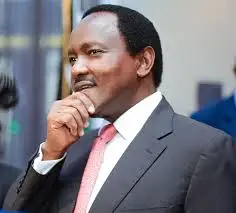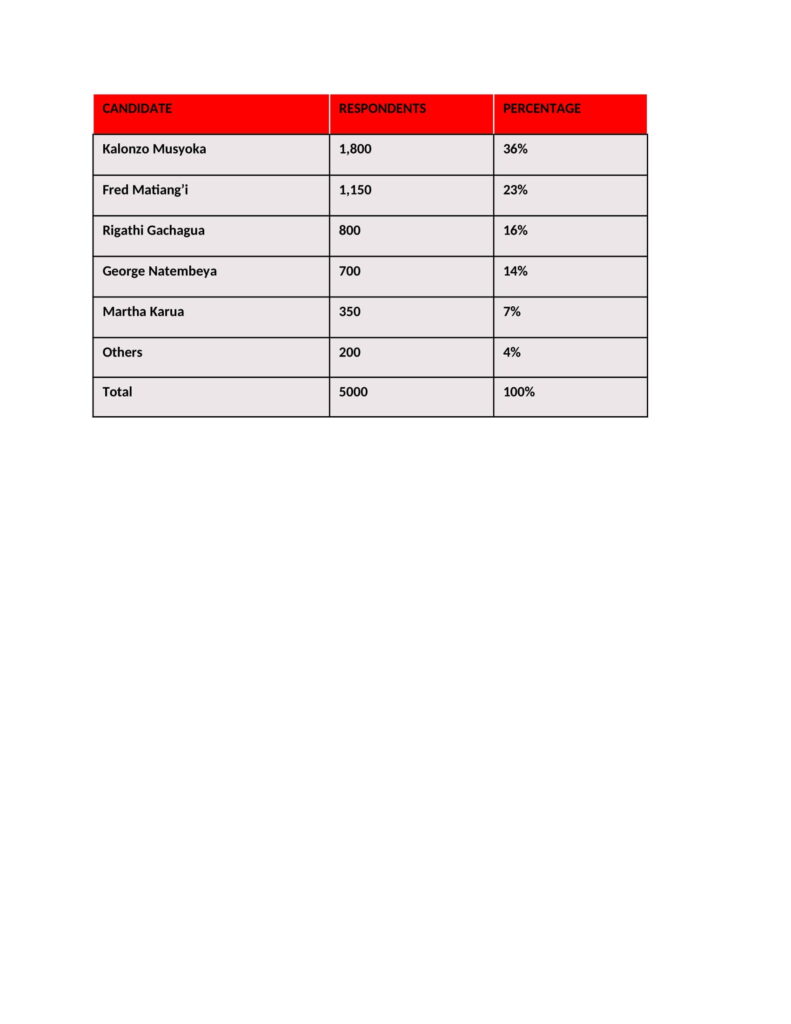In The Art of War, Sun Tzu counsels that one ought to look weak when strong, and strong when weak. Is it possible that this is what former Vice President Stephen Kalonzo Musyoka has been doing all through? From all corners, the man has been ridiculed, dismissed, and largely ignored. The argument is often that he is too weak, too polite, and too indecisive to be commander in chief. Yet it looks like as we inch closer to the 2027 race against President William Ruto, most people are quietly lining up behind the man. The most recent poll conducted by the Centre for African Progress (CAP) found that 36% from a sample of 5,000 respondents felt he is the right man to carry the opposition torch in the battle against incumbent President William Ruto and possibly beat him. The reasons shared by those who answered the question are varied.
There are those who feel that he is the calm and humane hand needed to replace the “violence” witnessed under President Ruto. Some express hope that he will bring the country together and create the necessary climate for economic development. Others argue that Musyoka has a reliable constituency of more than 2 million voters (this is true), he has demonstrated leadership by serving as Vice President, cabinet minister, and leader of a party, (also true), and that he is the only person who can comfortably work with Rigathi Gachagua without leading to a personality clash. The Riggy G issue comes in based on a widely held notion that in the 2027 election, he will be the kingmaker.
In that same poll, former Interior Cabinet Secretary Dr. Fred Matiang’i scores 23% with Rigathi Gachagua garnering 16% and Trans Nzoia Governor George Natembeya has 14%. Martha Karua manages 7% and other candidates such as Eugene Wamalwa, former Supreme Court President David Maraga, and Okiyah Omtatah together score 4%.

Despite vigorous social media campaigns, fringe candidates such as David Maraga and Okiyah Omtatah do not seem to be gaining traction. This points to the pragmatic nature of voters who do not want to take chances with the election that they feel should serve as a chance to teach President Ruto a lesson. In this context, a trusted and steady hand is preferable to an untested newbie.
While the Trans Nzoia governor has tasted the ballot once, which is not that much of a factor, the former president of the supreme court is new to politics. It is completely foreign territory for the elderly gentleman who seems shocked by the theatrics everyday politicians engage in. Dr. Fred Matiang’i is equally new, having stayed away from elective politics all his life. His claim to the pedestal is the stellar performance he registered when he served as cabinet minister in various dockets such as education and interior. However, others have questioned his record as interior CS, arguing that the infamous Yala River killings as well as the Ruaraka Land scandal taint him beyond repair.
The man of the moment, impeached Deputy President and Democracy for the Citizens Party (DCP) leader Rigathi Gachagua, is arguably the best weapon against President Ruto. However, even people from his own Mt. Kenya region feel that he should throw his weight behind someone else. According to CAP tracking polls, February and March numbers were favouring Matiang’i but that has since changed. Mt. Kenya voters from both West and East are strongly behind Rigathi Gachagua, a man they have resoundingly accepted as their kingpin. They do not hesitate to state that anyone who wants to access the mountain should do so through Riggy G. Yet they are ready to vote for anyone he brings to them provided that person is not President William Ruto.

So, what type of candidate will Musyoka be?
Other than Riggy G who comes to the United Opposition with a whopping 7.3 million votes, the next opposition figure who comes with a reliable vote that is substantial in number is Musyoka. Machakos, Makueni, and Kitui have a combined vote count of 1.7 million.
Machakos has 687, 565, Makueni has 479, 401, and Kitui has 532, 758 registered voters. This is 1, 699, 724.
Additionally, there are close to 800,000 Akamba voters in Nairobi County as well as Coastal Counties such as Mombasa, Lamu, Kwale, Taita Taveta, and Tana River. This leads to an estimate of about 2.5 million voters. Going by past voting patterns, Musyoka has demonstrated that he has a better grip on his tribal vote perhaps more than any other politician in this country. It has been argued by numerous political scientists that if he had served as Raila Odinga’s running mate in the 2022 presidential contest, they would have won the presidency.
Dr. Matiang’i’s Kisii and Nyamira Counties have around 960,000 votes only, and there is still no electoral evidence that he has control of these votes. Kisii in the Kenyan diaspora who are found in places such as Rongai in Kajiado County, Kitengela, Narok Town, Nairobi, Kitale and Mombasa are around 600,000, bringing the total Kisii vote to around 1.6 million. The Trans Nzoia governor and his Luhya group might boast of nearly 4 million votes but Luhyas have demonstrated the weird habit of not lining up behind their candidates whether fringe or mainstream.
This is how Musyoka remains the last man standing.
Other additional attributes that knock off the other candidates even farther down the staircase include the fact that he is the only one who has run a mid-level political party the longest, he has whipped his own elected leaders the longest, and he is the one who has served in senior administrative government positions the longest including deputy president under president Kibaki. He is also a widely respected diplomat who has helped broker peace deals in several parts of the African continent such as South Sudan.
Assuming he is the opposition candidate, he is almost assured of his 2.5 million Kamba vote. Add him Riggy G’s cousins’ vote of 7.3 million, and the count is at 9.8 million. If Matiang’i can bring the Kisii vote at the minimum, roughly 1.4 million, the count moves to 11.2 million. These are absolute numbers that ignore turnout and scores by the opposition that will obviously happen. From this point, votes from the Luhyas, Masais, and any other group will be a top up, and since the opposition voters are more excited than government supporters, there is no doubt that turnout will be higher in opposition zones. Gamesmanship geared towards suppressing votes in opposition zones by the Ruto administration will definitely be at play, and it is upon the opposition leaders to take preemptive action to nip it in the bud.
Another interesting issue that the study revealed is the comfort that some voters who prefer President Ruto have with a Musyoka candidature. According to this small number of Ruto voters, it is possible for them to vote for the opposition if Musyoka is the candidate. Their reasons include the argument that he is less vengeful, less polarizing, and is unlikely to engage in economy-destroying corruption. There were no Ruto voters who expressed admiration for the other opposition figures.
Is it all smooth for Musyoka?
No. Even the respondents who voted for Musyoka as their preferred opposition candidate insisted that he must get out of his comfort zone and start behaving like a president in waiting. They feel he waits too long to respond to national issues, he is not engaging in high octane politics that serious presidential candidates must engage in if they want to win, and he displays no preparation. “He must show hunger for the presidency since that is how you win the presidency in this country,” one respondent said. The importance of this point is underscored by the reality that the respondents who ended up voting for the other candidates such as Gachagua and Matiang’i did so by arguing that Musyoka seems rather unready to be president, and that Ruto, an indefatigable go-getter, will chew a cool Musyoka for breakfast.
The verdict- If Musyoka demonstrates that he is hungry for the seat and that he is ready to take on President Ruto, then they will readily back him. Will Musyoka heed their call? We shall find out in the sands of time.
